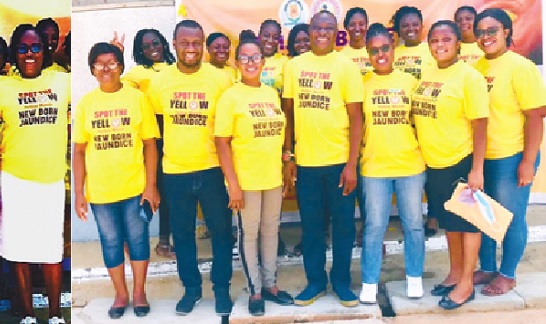
Weija-Gbawe Municipal Hospital fights neonatal jaundice
Neonatal jaundice, also referred to as neonatal hyperbilirubinemia or neonatal icterus or newborn jaundice, is a liver condition that causes the yellowing of an affected newborn baby’s skin and eyes.
Advertisement
Usually and clinically, neonatal jaundice manifests as yellowish discolouration of the skin, sclera (white outer layer of the eyeball) and mucous membrane.
The term jaundice was derived from the French word "jaune," which means yellow.
The condition is common in pre-term babies and the cause is often an immature liver, even though infection, medication or blood disorders may cause more serious cases.
Treatment of neonatal jaundice depends on its severity. Globally, jaundice affects about half of full-term newborns and 80 per cent of pre-term babies.
According to the Family Health Division of the Ghana Health Service (GHS), Ghana recorded about 10, 684 newborn jaundice cases in 2020.
Predisposing factors
A newborn who is not feeding well, wetting nappies or passing stools well in the first few days of life is more likely to get jaundice.
This is because they need water to be able to urinate the jaundice out, instead of it building it up in the blood.
Mostly, a newborn who is yellow in the first 24 hours of life may develop dangerously high levels of bilirubin and must actively be treated to prevent the destruction of the brain by jaundice.
Certain hereditary factors can also make a baby develop jaundice.
In most cases, treatment of neonatal jaundice is not required because light therapy (phototherapy) together with frequent exclusive breastfeeding can help resolve moderate or severe neonatal jaundice cases.
Empirical evidence reveals that neonatal jaundice occurs in the first two weeks of life.
It is also the most common condition that requires medical attention and hospital readmission in newborns (Gale, Seidman & Stevenson, 2001; Mitra & Rennie, 2017).
Campaign
Arguably, early detection of any disease is a prerequisite to fighting the disease effectively, and neonatal jaundice is no exception.
Relevant to the early detection and treatment of the condition is awareness creation, which makes people knowledgeable and more empowered to fight the condition.
It is in this regard that the Paediatric Society of Ghana (PSG) has declared the month of May every year as a Jaundice Awareness Month.
Within curative healthcare circles, the awareness campaign has been associated with yellow to denote the yellowing skin symptom among affected babies.
As usual, the 2023 yellow month campaign in Ghana was meant to create nationwide awareness of preventing disability and death in babies, resulting from newborn jaundice. Accordingly, this year’s theme for the awareness campaign was “Spot the yellow; Stop disability and death.”
In tandem with the 2023 PSG theme for the nationwide neonatal jaundice campaign, the Paediatric Department of the Weija-Gbawe Municipal Hospital, popularly called Akawe, had intensified awareness creation efforts within the municipality and for that matter, the catchment area of the hospital.
This campaign has been supported by the Municipal Health Directorate led by Dr Naomi Apea and the hospital management led by the Medical Superintendent, Dr David Kwabena Okoh.
The Municipal Deputy Director of Nursing Services (DDNS), Cynthia Lamptey, has also been very supportive in executing the jaundice awareness creation agenda of the hospital.
Speaking on the Akawe strategy for fighting neonatal jaundice, a Paediatric Nurse Specialist, Matilda Owusua Gyamfi-Addae, and a Senior Nursing Officer, Vida Atta, of the Hospital’s Paediatric Department, indicated that within the core of the strategy was the need for effective and extensive education on early detection and treatment of neonatal jaundice, as well as a healthy and responsive collaboration between the midwives, especially those working at the hospital’s labour ward, and the staff of the Paediatric Department of the same hospital.
Other strategies were frequent exclusive breastfeeding and hygienic extraction of breastmilk for newborns who are unable to suckle their mothers’ breasts; provision of effective phototherapy for affected newborns and education for husbands of the affected lactating mothers and significant others who could lend support for such mothers to fight the condition.
The Head of the Hospital’s Health Information Unit, Albert Nii Laud Martey, indicated that the hospital saw and successfully treated 101 neonatal jaundice cases in 2022.
So far, in 2023, about 20 cases have been treated.
The hospital’s success story is that even though it lacks a Neonatal Intensive Unit (NICU), its management, through the instrumentality of the Head of Nursing, Carolina Fati Asigri, had established a small babies’ unit, which improvises for a NICU to save neonatal lives from jaundice complications and mortalities.
Aside this initiative, the hospital has intensified its early detection and treatment of neonatal jaundice in the catchment area.
Challenges at Akawe
Despite their frantic efforts directed at early detection and treatment of neonatal jaundice, the authorities of the Weija-Gbawe Municipal Hospital located on McCarthy Hills in Accra have been confronted with certain challenges.
Even though the challenges are surmountable, management does not yet have what it takes to surmount them all simultaneously.
Corroborating these challenges include inadequate firefly phototherapy machines, inadequate baby cots, frequent congestion at the small children’s ward and no paediatrician at post currently because the only one at post had gone for further studies.
Way forward
Some of the nurses of the hospital believe that the foregoing challenges could be overcome if child health-oriented individuals and organisations could donate phototherapy machines to the hospital, additional baby cots provided and a more spacious paediatric unit built for the hospital.
Fighting any disease, and for that matter neonatal jaundice, calls for early detection and treatment.
According to the PSG, failure to identify and treat severe neonatal jaundice can result in life-threatening neurological complications and deaths.
Commendably, the Weija-Gbawe Municipal Hospital has been committed to fighting neonatal jaundice even though the hospital is resource-constrained.
This hospital, thus, needs external support to continuously “spot the yellow” and prevent childhood disability and death on account of jaundice.
The time to help is now.
The writer is a hospital administrator
Email: [email protected]




